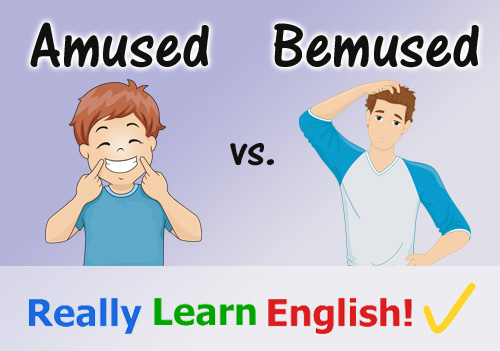Amused vs. Bemused
What is the difference?
Amused and bemused are two commonly confused words in the English language.
Both words are adjectives and are used to describe feelings. Although their spellings are quite similar, their meanings are completely different. It's important to learn the difference, because one word means that something is entertaining and the other means that something has confused you!
Both words have verb and noun forms, so understanding the difference is also a great way to build your vocabulary.

Click Here for Step-by-Step Rules, Stories and Exercises to Practice All English Tenses
Amused
The word amused has two definitions, both related to having a good time. First, amused can mean that you find something funny. Typically, people are amused by jokes, funny conversations, and humorous events.
Bear in mind that amused does not mean that you find something extremely funny, as in when you laugh out loud or laugh so hard that you cry. Instead, amused means that something makes you smile, or makes you laugh a little bit.

Amused can also mean that you find something entertaining or enjoyable. Examples of things that make people amused are fun activities such as games, puzzles, arts and crafts and hobbies. When used in this sense, amused doesn't necessarily mean that you laugh or smile, it only means that you have fun.

There are a variety of other word forms of amused. As is common in English, in addition to the –ed form of the adjective there is also an –ing form: amusing. Something is amusing if it makes you feel amused.
The root of both adjectives is the verb to amuse, which, like the adjectives, has two meanings (to cause someone to find something funny, and to entertain someone).Last but not least, the noun form of amused is amusement.
Synonyms for amusement are fun, laughter, pleasure and entertainment.

Collocations
Amused is often paired with verbs such as appear, look and seem. For example, you might say, "I wondered why my friend looked so amused" or "My boss did not seem amused when I told him that the project would be late."

You have probably already noticed that in order to explain what has caused someone to feel amused, we use the word "by." An example of this use would be a sentence such as, "Children tend to be amused by video games."

The verb to amuse can be used in a reflexive sense, as in this example: "While waiting for my friend, I amused myself by reading a book."

Other common expressions related to amused are:
- To be highly amused
(to find something very funny or extremely entertaining) - To be highly amusing
(to be very funny or extremely entertaining) - To find something or someone amusing
(to think that something/someone is funny or entertaining) - To keep someone amused
(to keep someone occupied or busy with something) - To provide amusement
(to be fun, or to help someone have fun) - To never fail to amuse someone
(to always be funny or entertaining) - An amusement park
(a theme park with rides and roller coasters)

Examples:
- I was amused by the movie, because a lot of the dialogue was quite funny.
(The movie made me laugh, because it had a funny script.) - Sarah's parents were amused when they read the story their daughter had written.
(Sarah's parents thought their daughter's story was humorous.) - My little sister loves cartoons. She is always very amused by them.
(My little sister finds cartoons very enjoyable, and always likes to watch them.) - The Smith family found the amusement park very amusing.
(The Smith family enjoyed their trip to the theme park.) - The ball of wool provided hours of amusement for the little kitten.
(The ball of wool kept the kitten entertained for a long time.) - Hannah's stories never fail to amuse me. She always has something humorous to discuss.
(I always enjoy talking to Hannah, because tells funny stories.)
Bemused
Although bemused looks similar to amused, the definition is not related. Bemused means that you find something confusing, puzzling, or that you do not understand something. People feel bemused when they see something strange, or when something sudden or unexpected happens.

Bemused can sometimes be difficult for students to learn, because the definition of the word is starting to change. Sometimes people use bemused in order to mean a little bit amused. Most linguists argue that this use of the word is incorrect, and most dictionaries do not acknowledge this use of the word. In order to be certain you are speaking correctly, it is best to use bemused with its original meaning – creating confusion – and amused to mean that something is funny or entertaining.

Bemused has the same word forms as amused. The–ing form of the adjective, bemusing, is used to describe things that make you feel bemused. The verb to bemuse means to confuse, to puzzle or to perplex and the noun bemusement means the feeling of being bemused.

Collocations
Like amused, bemused is often paired with verbs such as appear, look and seem. Similarly, when we want to explain what has caused someone to feel bemused, we use the word "by."
The verb to bemuse cannot be used in a reflexive sense, because it is impossible to confuse or puzzle yourself.
The collocations "highly bemused" and "highly bemusing" are common, as is the expression "to find someone (or something) bemusing."

Other common expressions related to bemused are:
- To have a bemused expression on your face (to look confused)
- To look at someone in bemusement (to look confused)
- To leave someone feeling bemused (to make someone feel confused)

Examples:
- I'm feeling bemused. Perhaps you could explain that to me again? (I'm a little bit confused. Could you explain that to me again?)
- After the professor's explanation, many members of the class appeared bemused. (Many students appeared not to understand the professor's explanation.)
- Hector was bemused by his friend's sudden decision to leave his job. (Hector was puzzled when his friend told him that he was going to leave his job.)
- This situation is highly bemusing. I don't understand it at all! (This situation does not make any sense!)
- Why do you have a bemused expression on your face?(Why do you look confused?)
- My parents looked at me in bemusement when I told them I wanted to become an acrobat. (My parents appeared confused after I told them about my future plans.)
Tips
The word bemused is much less common than amused. Although bemused is a useful word, it is much more likely that you will use amused on a day-to-day basis.
A Story to Practice Amused vs. Bemused
Dan and Lon are best friends. Dan is always amused, while Lon is always bemused. For example, now Dan is doing his homework. He thinks the topic is quite funny. He finds it very amusing! He just can't stop laughing in amusement. Lon, on the other hand, is feeling bemused. He is staring at his confusing homework in bemusement.
Now Dan and Lon are looking at each other. Dan is amused by Lon's bemusement, and Lon is bemused by Dan's amusement. But neither amusement nor bemusement will help them finish their homework!

Quiz
Answer the following 10 questions and then check your answers. Each question is worth 10 points.
Part 1:
- Which of the following is a correct definition of amused?
- When something entertains you
- When something confuses you
- When you think something is strange
- When you find something extremely funny
- Which of the following is a correct definition of bemused?
- When something is entertaining
- When you don't enjoy something
- When you don't understand something
- When something is very funny
- Which sentence is written correctly?
- Puzzles are a great way to bemuse young children.
- Can you explain that a different way? I'm feeling amused.
- In my opinion, roller coasters are very bemusing.
- I find Monopoly to be a very amusing game.
- Which of the following is written incorrectly?
- I am often amused by William's jokes.
- I'm feeling amused, because the movie was so sad.
- After the meeting, many people felt bemused.
- You look bemused. Should I explain that again?
Part 2:
- Which of the following is true about amused and bemused?
- Amused is more formal than bemused.
- There are noun and verb forms of both words.
- Bemused is a synonym for amused.
- Amused is not a very common word.
- Which of the following is NOT true about amused and bemused?
- Both words collocate with appear, look and seem.
- The two words have different definitions.
- As verbs, both words can be used reflexively.
- The two words are synonyms for "strange."
Part 3:
- The play made me laugh so much. I found it highly __________.
- amusing
- bemusing
- amused
- bemused
- Many people in the office feel __________, because the expectations for the project are not clear.
- amusing
- bemusing
- amused
- bemused
- If you give my brother a coloring book, he can__________ for hours.
- be amusing
- be bemusing
- amuse himself
- bemuse himself
- My grandmother knows dozens of card games. For her and her friends, cards __________.
- provide hours of amusement
- provide hours of bemusement
- are highly amused
- are extremely bemused
Answer Key
Part 1: 1. A | 2. C | 3. D | 4. B
Part 2: 1. B | 2. C
Part 3: 1. A | 2. D | 3. C | 4. A
Get Updates, Special Offers, and English Resources
Download your FREE GIFT (the first two chapters of
English Short Stories Book and Workbook)
as soon as you join!

By submitting your email, you consent to receiving updates and newsletters from us and to the sharing of your personal data with third parties for the purposes of sending you communications. We will not spam you. You can unsubscribe at any time. For more information, please see our privacy policy.





